Christian Schubart: the prison years
Richard Law, UTC 2017-05-15 18:40
Hohenasperg, 1777
For more than ten years, beginning in January 1777, the German writer, journalist and musical virtuoso Christian Friedrich Daniel Schubart (1739-1791) was imprisoned in the fortress of Hohenasperg in the Duchy of Württemberg.
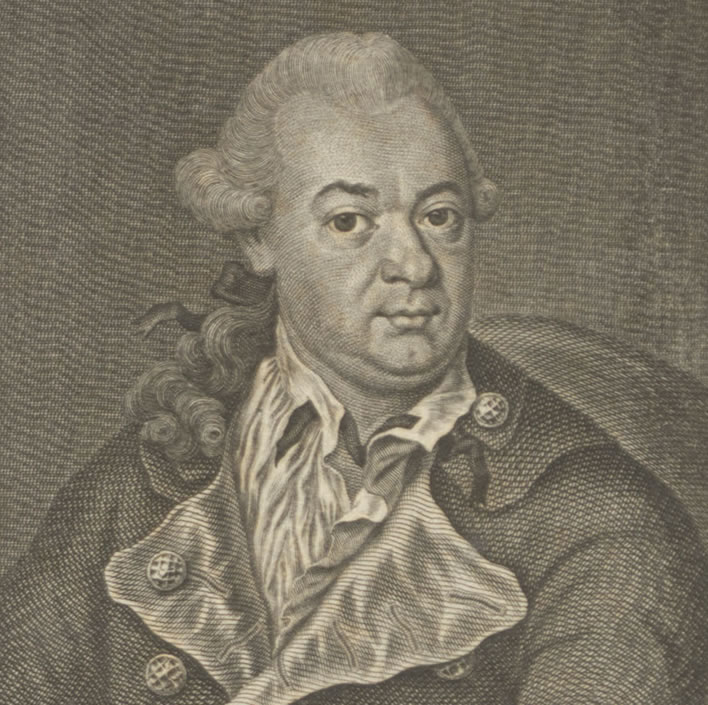
Christian Friedrich Daniel Schubart, engraved by Johann Michael Söckler from a work by Christoph Nikolaus Kleemann, before 1781. Image: ©Tobias-Bild Universitätsbibliothek Tübingen.
Hohenasperg had a dark reputation, a notoriety that had spread well beyond the borders of the duchy. It sits on the top of a steep-sided mound that rises about 100 m above the surrounding plain. Some joked that it was the highest mountain in Germany – it took so long to get down from it. For the five hundred years before Schubart's incarceration it had been used more as a place of imprisonment and torture than as a military stronghold.
When the carriage with Schubart and his guards trundled up the road to the fortress that winter afternoon of 24 January he was, he tells us, filled with dread. He had no idea what was about to happen to him. [Leben 2:143]
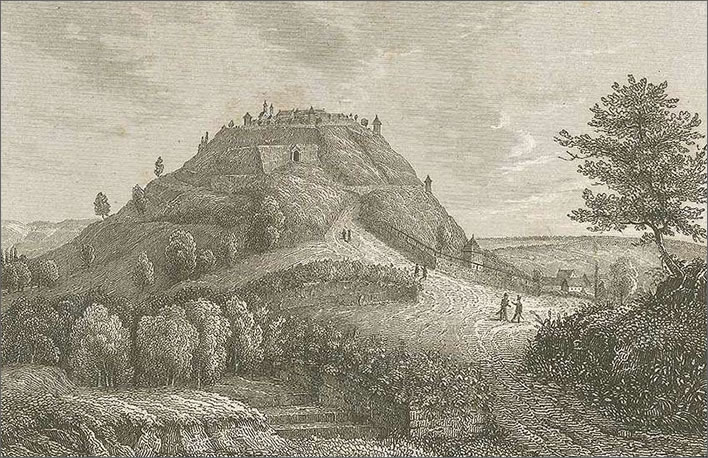
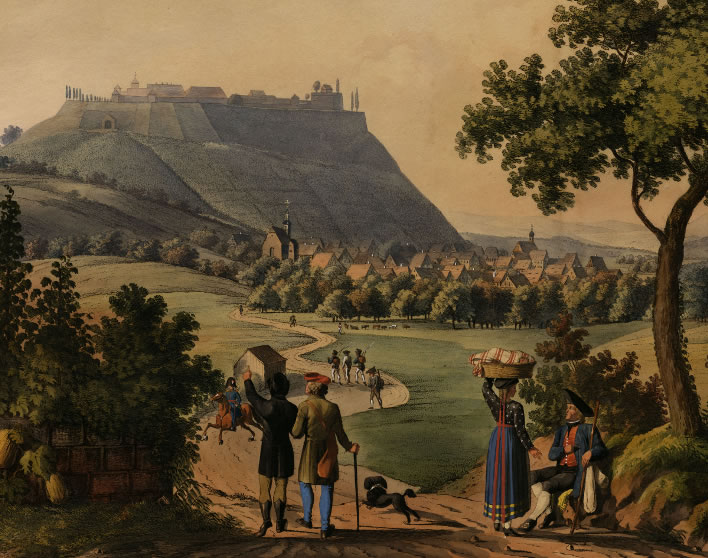
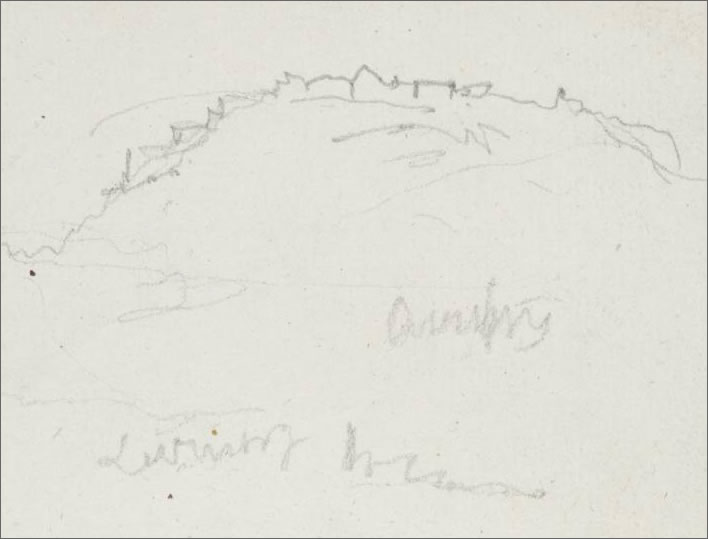
Three views of Hohenasperg. Top: The fortress of Hohenasperg and the road from the north, 1860. Image: Landesarchiv Baden-Württemberg, Abt. Hauptstaatsarchiv Stuttgart.
Middle: Lithograph by Georg Ebner, c. 1820. Foto: HdGBW
Bottom: Sketch by Joseph Mallord William Turner, Distant View of Hohenasperg, 1833. Instantly recognizable! You can always tell when a great artist is at work. Image: tate.org.uk
We covered last year Schubart's background and the events leading up to his detention, but the summary is simple: he was lured on to territory where he could be captured by the Duke of Württemberg's agents. Calling the capture an 'arrest' would imply a legal formality which was not present. He was never charged of any crime, let alone tried or convicted, but instead taken straight to prison.
Now, 240 years after his arrival in Hohenasperg, we'll look at the remarkable features of the ten years he would spend there as the unwilling guest of Duke Carl Eugen (1728-1793).
Banged up – and almost kippered
On his arrival he was taken to his cell under the gaze of Carl Eugen and his wife Franziska (1748-1811), who were looking down on him from a window. [Leben 2:144, 2:146] It was the dead of winter. The Duke and Duchess had left the warm comforts of the great palace in Ludwigsburg and travelled the five kilometres to Hohensperg along snowy roads. Seeing Schubart tossed into a dungeon was obviously worth all the discomforts. And there can be no doubt that Schubart was also intended to catch sight of them – not just the Duke but his wife, too. His imprisonment was not a judicial act – it was personal.
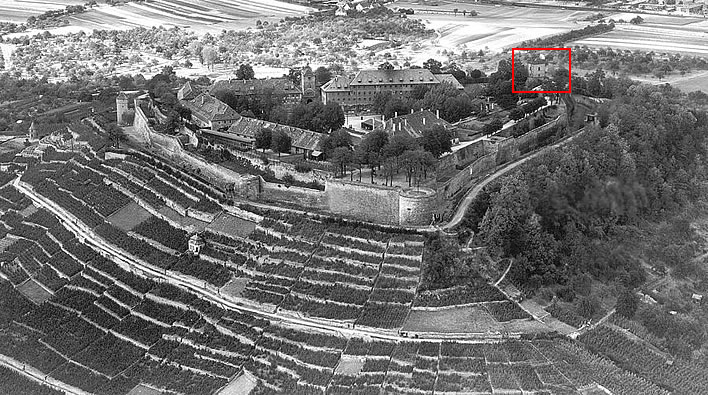

Two aerial views of Hohensperg. 'Schubart's Tower' is marked in red. Top: A photograph from 1950. At the end of the war the fortress became the 'Camp 76 Internment Facility' run by the US Seventh Army. The guard towers installed by the Americans can be seen at the corners of the outside wall.
Bottom: A modern photograph. Image: HdGBW. The fortress now houses the Justizvollzugskrankenhaus Hohenasperg, a psychiatric prison.
According to an anecdote related much later by Schubart's son, Ludwig, his entry into his cell was not without incident:
The dungeon cell in the tower had a kind of stove that had been lit before his arrival. As he entered, the cell was full of smoke, that got so bad in such a short time that he thought they were trying to put an end to him in this fashion. He pressed his face into the straw bed and commended his soul to God.
Finally, since he could scarcely breathe anymore, he ripped the door open at the bottom and called the guards. The corporal came immediately and opened the door […]
He was brought to the room of the commander until the stove could be repaired. The first thing that he did was to go to the piano and played an unchained fantasy that released the cares pressing down on his heart. The Duke liked to tell this anecdote with great enjoyment to various strangers.
Karakter 68f.
It was indeed personal.
Chapters
Sources
All sources are in German, unless otherwise noted. All translations ©FoS.
| Casanova | Casanova, Jacques. Mémoires de J. Casanova de Seingalt, écrits par lui-même, Paris, Garnier Frères, 1880. [FR] |
| Hauff | Hauff, Gustav. Christian Friedrich Daniel Schubart in seinem Leben und seinen Werken. Stuttgart: Kohlhammer, 1885. |
| Holzer | Holzer, Ernst. Schubart als Musiker, Kohlhammer, Stuttgart, 1905. Series: Darstellungen aus der Württembergischen Geschichte, Bd. 2. |
| Hoven | Hoven, Friedrich Wilhelm von. Biographie, Verlag Schrag, Nürnberg, 1840. |
| Kerner | Kerner, Justinus. Das Bilderbuch aus meiner Knabenzeit, Bieweg und Sohn, Braunschweig, 1849. |
| Müller | Müller, Wolfram. ‘War die Schubart-Zelle Schubarts Zelle?’ Beiträge zur Landeskunde 6 (1987): 11–15. |
| Ranke | Ranke, Wolfgang. Schiller, Schubart und der Hohenasperg. Marbach am Neckar: Dt. Schillerges, 2009. Spuren 86. |
| Kerker | Schubart, Christian Friedrich Daniel. Gedichte aus dem Kerker, Orell, Geßner, Füßli und Co., Zürich, 1785. |
| Leben | Schubart, Christian Friedrich Daniel. Leben und Gesinnungen, zweiter Theil, Mäntler, Stuttgart, 1793. |
| Gedichte | —. Sämtliche Gedichte, 2 Bände, Carlsschule, Stuttgart, 1786. |
| Karakter | Schubart, Ludwig. Schubart's Karakter, von seinem Sohn, Erlangen, self-published, 1798. |
| Briefe | Strauß, David Friedrich. Schubart's Leben in seinem Briefen, 2 Bände, Emile Strauß, Bonn, 1878. |
| Uriot | Uriot, Joseph. Description des fêtes données à l’occasion du jour de naissance etc., Cotta, Stougard, 1763. [FR] |
0 Comments UTC Loaded:
Input rules for comments: No HTML, no images. Comments can be nested to a depth of eight. Surround a long quotation with curly braces: {blockquote}. Well-formed URLs will be rendered as links automatically. Do not click on links unless you are confident that they are safe. You have been warned!